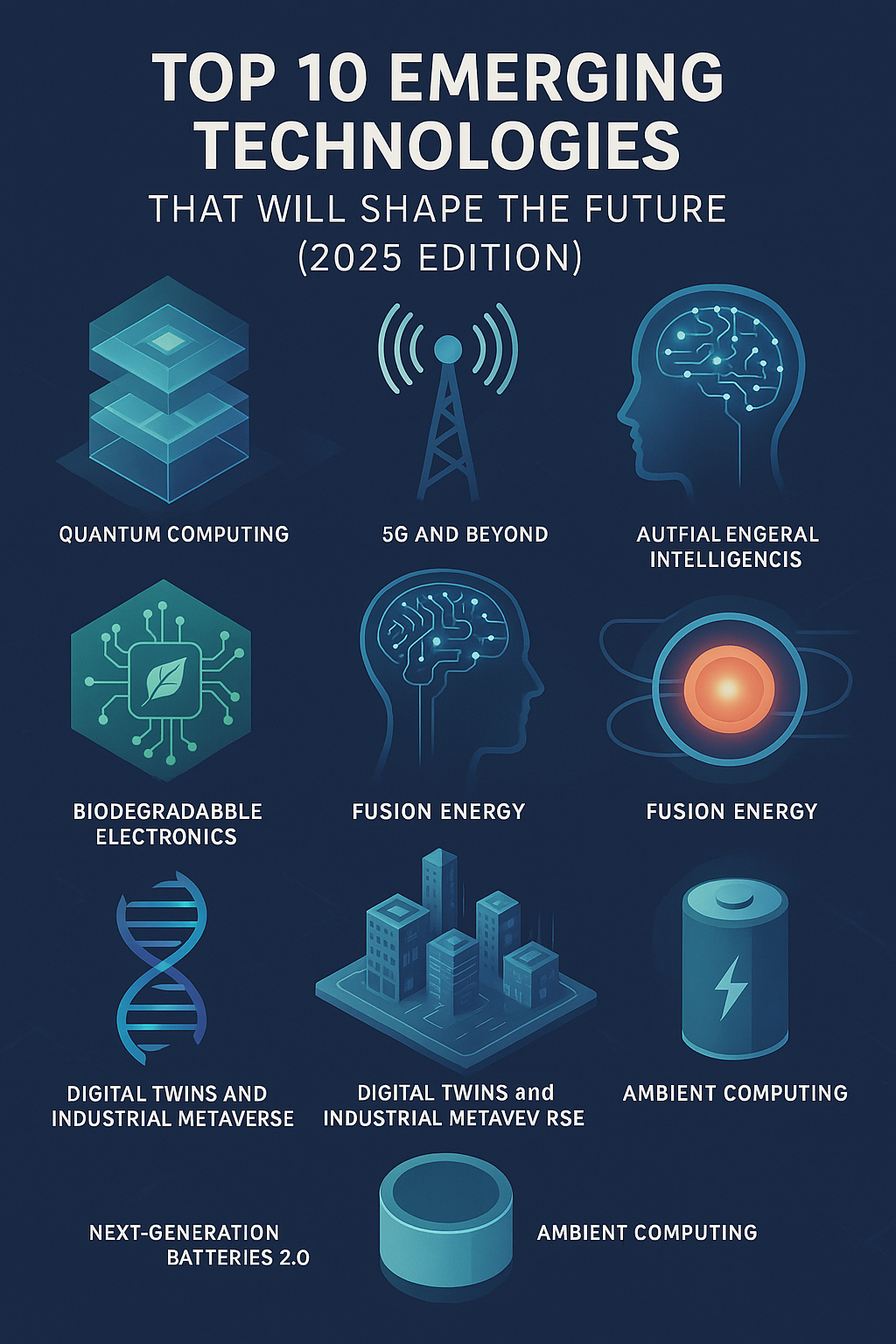In an age defined by rapid innovation, 2025 is poised to be a pivotal year. From how we communicate and work, to how we heal, travel, and power our world — technology is rewriting the rules. In this article, we explore 10 emerging technologies that are not only shaping industries but are also redefining everyday life.
1. Quantum Computing
Quantum computing is no longer science fiction. Tech giants like IBM and Google are pushing boundaries with machines that harness the bizarre principles of quantum mechanics. Unlike traditional computers, which use bits, quantum systems use qubits, allowing them to solve problems once thought impossible — such as simulating molecules for drug discovery or cracking unbreakable codes. While still in its infancy, quantum computing could soon transform cybersecurity, logistics, and more.
2. 5G and Beyond
5G isn’t just about faster internet. It’s the backbone of a hyperconnected world — enabling real-time remote surgeries, autonomous vehicles, and smart cities. With countries expanding 5G networks and researching 6G technologies, the future of connectivity will be faster, smarter, and more immersive than ever.
3. Artificial General Intelligence (AGI)
While artificial intelligence (AI) is already transforming industries, AGI represents a leap forward — systems that think and learn like humans. Though we’re still years away from fully achieving AGI, 2025 will see foundational steps: smarter automation, more adaptive machines, and broader AI decision-making in complex fields like healthcare and education.
4. Biodegradable Electronics
E-waste is a growing global concern. Enter biodegradable electronics — devices made from organic materials that decompose naturally. Researchers are developing sensors, batteries, and circuits that dissolve harmlessly, which could revolutionize everything from medical implants to environmental monitoring.
5. Neural Interfaces
Imagine controlling a computer or prosthetic limb with your mind. Neural interface technology, led by companies like Neuralink, is turning this vision into reality. These brain-computer interfaces (BCIs) could restore mobility for paralyzed patients or offer new ways to interact with technology — all by decoding brain signals.
6. Fusion Energy
Clean, limitless energy has long been a dream. With projects like ITER and advancements in magnetic confinement, 2025 is a hopeful year for nuclear fusion. Unlike traditional nuclear power, fusion mimics the sun’s energy process and produces no long-term waste. A successful breakthrough could mean an end to fossil fuel dependency.
7. Digital Twins and the Industrial Metaverse
Digital twins — virtual replicas of physical systems — are revolutionizing manufacturing, aviation, and even city planning. Paired with immersive metaverse technologies, engineers can now simulate, test, and improve infrastructure in real time. In 2025, expect to see this tech embedded in everything from smart factories to healthcare.
8. Next-Generation Batteries
The electric revolution needs better batteries. Enter solid-state technology and lithium-sulfur chemistry — promising safer, longer-lasting, and faster-charging alternatives to today’s lithium-ion cells. These next-gen batteries could drastically improve electric vehicles, renewable storage, and mobile devices.
9. CRISPR and Gene Editing 2.0
CRISPR has already changed genetic science, but its next iteration — known as “base editing” — brings more precision and fewer risks. Scientists are now targeting genetic disorders, cancer mutations, and even aging-related genes. By 2025, gene therapies could be more accessible, personalized, and safe.
10. Ambient Computing
Ambient computing weaves technology invisibly into our environment — think smart assistants that understand context, lighting that adapts to your mood, or homes that learn your habits. With advancements in AI, IoT, and sensors, 2025 is set to make our surroundings more intuitive and responsive.
Conclusion
The future is arriving faster than ever. As these emerging technologies continue to evolve, they will challenge the way we think, live, and interact with the world. While each holds immense promise, they also raise questions around ethics, privacy, and accessibility. One thing is clear: staying informed and adaptable will be key to thriving in this exciting new era.



